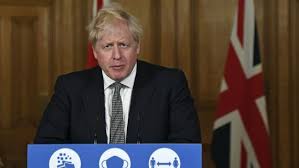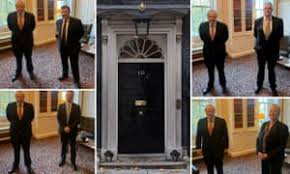Boris Johnson self-isolates after contact with coronavirus-infected MP

London: Boris Johnson is self-isolating after coming into contact with an MP who tested positive for coronavirus.
The prime minister was notified by NHS Test and Trace that he would need to remain in Downing Street after meeting with a small group of politicians on Thursday morning, including the member for Ashfield, Lee Anderson, who has since tested positive for Covid-19.

Johnson was urged to follow the guidance on self-isolation due to a number of factors including the length of the meeting, having spent 35 minutes in the MP’s presence on 12 November. Mr Anderson developed symptoms the following day.
A No 10 spokesperson said Mr Johnson, who has already caught the virus and ended up in intensive care in the spring, is well and has no symptoms.
“The prime minister has today been notified by NHS Test and Trace that he is required to self-isolate as a contact of someone who has tested positive for Covid-19”, the spokesperson said, adding that he “will follow the rules and is self-isolating”.
“He will carry on working from Downing Street, including on leading the government’s response to the coronavirus pandemic.”
Mr Johnson had hoped to use this week to relaunch his government following the departure of aides Dominic Cummings and Lee Cain. The rules suggest he will now have to keep to himself for 11 days to see whether he develops symptoms.
Downing Street is determined that this does not blow his political plan off course; Mr Johnson is understood to be planning to address the country from self-isolation.
No 10 sources have also signalled that he will speak to the relevant authorities about taking part in parliamentary business remotely.
Following the news, Commons leader Jacob Rees Mogg said he had been “urgently exploring how we can support additional virtual participation in the Commons”. Mr Rees Mogg, a Tory traditionalist, did not explicitly link the move to the PM’s situation, but he has long resisted calls from other MPs to widen virtual participation, including those who are clinically vulnerable.
Late on Sunday, the Conservative MP Tracey Crouch said Mr Rees Mogg had called her, before the PM was told to self-isolate, to say that the clinically extremely vulnerable would now be able to participate in Commons debates. Ms Crouch was diagnosed with breast cancer in the summer.
There is unlikely to be an early way out of self-isolation for the PM via testing. No 10 said he would follow the rules, which means isolating even with a negative test. This is because current tests do not always detect the virus in people who have not yet developed symptoms.
The required self-isolation period is 14 days from the last contact with the infected person, so Mr Johnson, who met Mr Anderson on Thursday, will have to stay in Downing Street until 26 November.
A photo of the 12 November breakfast meeting posted to Facebook by Mr Anderson shows the backbench Conservative and the prime minister standing just 1m apart in Downing Street.
Labour’s Chris Bryant criticised Mr Johnson for failing to limit his potential exposure to the virus.
“I don’t understand. I thought England was in lockdown”, he wrote on Twitter. “What was the PM doing not maintaining a social distance with another MP? Have I missed something?”
Mr Anderson wrote in a statement posted to Facebook that he had lost his sense of taste the day after his meeting with the prime minister, while his wife had developed a “bad headache” at the same time.
“I had no cough, no fever and felt well”, he added. “We both had a test on Saturday and the result came in Sunday morning. My wife and I both tested positive.I feel absolutely fine and my biggest concern is my wife who is in the shielded group. But we are both feeling good.”
In April the PM was treated in the intensive care unit of St Thomas’ Hospital in London after contracting coronavirus. Scientists are still working to understand how immunity to the Sars-Cov-2 virus works.
A number of papers have been published on the relatively rare instances of people catching the virus twice – including a report last month on a 25-year-old from Nevada who suffered far worse symptoms the second time around.





